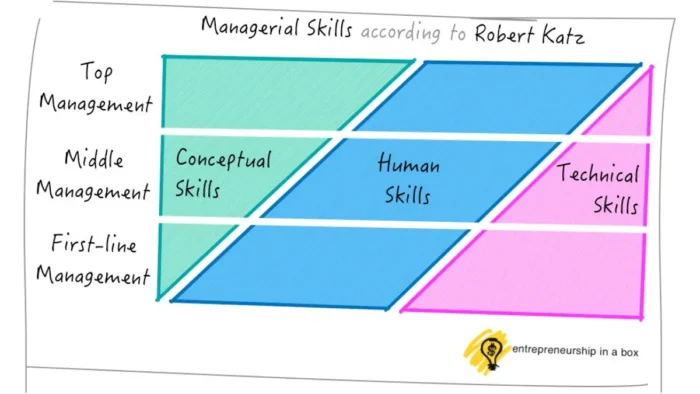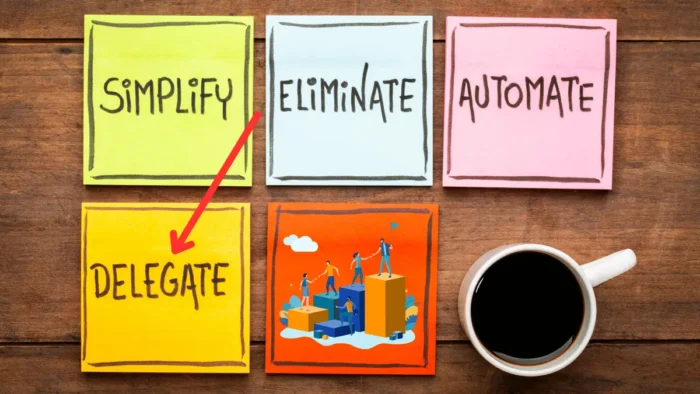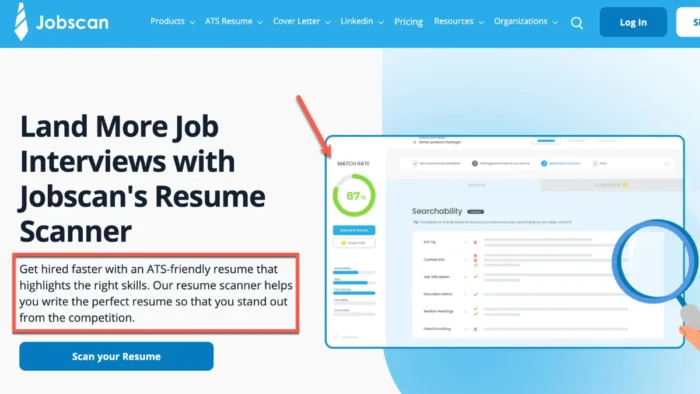Improving your resume with the right management and leadership skills is crucial if you want to advance your career on the managerial level. In this guide, we’ll specify the essential resume management skills employers value and discuss how to present them effectively.
You can expect practical insights, from hard to soft skills, proven to upgrade your career opportunities. After reading this article, you will transform your managerial skill set into a compelling resume narrative.
Key Takeaways
- Management skills are essential for career progression, including hard skills like technical expertise and soft skills like conflict resolution, which are crucial for effective team leadership.
- A well-crafted resume showcasing top management skills (such as leadership, decision-making, and strategic thinking) can improve job opportunities by demonstrating your capacity to drive teams and projects successfully.
- Continuous improvement of your management skills through courses, certifications, and mentorship is vital for career advancement, along with effectively tailoring and presenting these skills on your resume for possible employers.
Defining Management Skills
Professionals often rely on various management skills to climb the corporate ladder. These contain technical knowledge, industry expertise, and problem-solving capabilities that are crucial for success in managerial positions.
As competition increases in today’s marketplace, these skills not only impact team performance and productivity but also serve as the distinguishing factor between good leaders and exceptional ones.
There are various routes through which you can develop your management skills. This includes gaining experience through hands-on work, seeking formal education programs related to management roles, or participating in personal development activities such as attending professional workshops and seminars or reading informative literature.
Since these skills are transferable across different industries and job functions, they hold significant value for all of you seeking leadership positions or striving to advance your career trajectory.
Hard Skills vs. Soft Managerial Skills

Being able to distinguish between hard and soft management skills is essential in understanding the diverse range of managerial competencies.
Hard management skills contain important abilities such as technical skills, specific methodologies relevant to job performance, financial forecasting, strategic planning as a part of conceptual management skills, and proficiency in specific project management or other important software for doing the specific job.
Hard skills can be taught formally through quantifiable methods.
For example, if you hold a managerial position that involves scheduling tasks or projects, your hard skills would include specialized techniques related to scheduling within your field.
On the other hand, soft management skills (also known as people or interpersonal skills) involve qualities like conflict resolution and effective communication. These are crucial for promoting a productive work environment and motivating team members. Developing soft skills requires experience coupled with self-awareness.
Remember that hard skill sets often go hand-in-hand with softer ones with transferability across different roles and sectors.
Related: The Team Effectiveness and Different Roles in Teams That Win
Technical, Conceptual, and Interpersonal Skills
When we talk about management skills, there are generally three different groups of skills:
- technical skills
- conceptual skills and
- interpersonal skills

I will not go into a larger explanation of these skills because you can read more about them and what they cover in three management skills to become a better manager.
Top 10 Management Skills to Showcase in Your Resume
Your resume can be seen as a professional advertisement that showcases your capabilities to potential employers. To make an impact, you must highlight all the important management skills you possess.
It’s, therefore, appropriate that these desired characteristics are communicated effectively throughout your resume to attract possible employers and stand out among other applicants competing for that same position.
1. Leadership Skills and Team Management

Effective management roles require essential skills in leadership and team management. These interpersonal skills, as part of your management skills, serve as the basis for motivating your team members to excel, setting a positive example, nurturing talent, and fostering a shared purpose toward achieving success.
So, it is important to highlight how these leadership skills have resulted in improved workflow, productivity, or team accomplishments on your resume. They can demonstrate your proficiency in managing teams, which is the primary job of each manager.
To provide context for your ability to handle responsibilities effectively, it is important to mention the scale of your experience with project management and leading teams. This could include specifying the number of team members involved or the scope of projects handled.
For example, you can write the following:
As a project manager at [specific company], I successfully led a team of 10 members to complete over 20 projects within budget and deadlines.
2. Delegation Skills on a Resume

Demonstrating effective delegation skills by describing how you strategically assigned tasks among competent individuals highlights your management skill for leveraging their strengths efficiently. Effective task coordination showcases that you can assign duties appropriately, leading to better teamwork dynamics and increased efficiency.
Related: 6 Steps Delegation Process to Increase Your Productivity as a Manager
For example, when you want to highlight your delegation skills, you can write something like this:
As a project manager for a critical software development project at [specific company], I was responsible for a diverse team of coders, designers, and testers. Recognizing each team member’s unique strengths and capacities, I allocated tasks strategically. I assigned complex coding tasks to our most experienced programmers, while the design elements were assigned to our creatively inclined team members. This approach streamlined the process and led to a 35% increase in overall productivity.
Here is an example of a marketing department manager:
In my role as the head of the marketing department, I effectively delegated tasks during our annual product launch. I assigned market research to our analytical team members, content creation to our creative writers, and campaign strategy to our best planners. This strategic delegation resulted in a successful launch with 15% more sales in the first month than planned
3. Collaboration and Communication Skills on a Resume

Effective collaboration and communication skills are key to successful management as they promote teamwork, clarity in expectations and feedback, and conflict resolution.
To showcase your skills in communication and collaboration on your resume for management positions, you must highlight your achievements, such as developing scalable back-end systems through cross-functional teams or organizing events outside of work.
Use action verbs like “collaborated,” “partnered,” or “coordinated” alongside specific departments or teams you have worked with. Additionally, mention proficiency with tools like Slack, Microsoft Teams, and Trello, which demonstrate hands-on expertise in facilitating teamwork.
Let’s look at some examples that will help you highlight communication and collaboration skills on your resume.
As the lead software engineer at [specific company], I partnered with the Product Design and User Experience teams to develop scalable back-end systems that improved product functionality and user satisfaction by 25%. Our cross-functional team used Microsoft Teams for effective communication and Trello for project management, ensuring seamless collaboration
Or, if you were a human resource manager and you want to get the attention of a hiring manager, you could write, for example:
While serving as the HR Manager at [specific company], I coordinated a series of team-building events outside of work, partnering with various department heads using Microsoft Teams for planning and communication. After these events, we saw a 20% improvement in overall employee satisfaction scores.
4. Time Management and Organizational Skills
Effective project management skills and goal achievement rely heavily on your organizational skills and time management techniques.
Strategies such as setting specific goals, staying on top of deadlines, proper planning and scheduling, and practices like time blocking, GTD, Pomodoro Technique, etc., can greatly improve project management efficiency and meeting important timelines.
The key to successful time management is having well-developed organizational skills that enable you to systematically use tools such as planners, create task lists, break down tasks into smaller, more manageable ones, and delegate tasks appropriately for optimal work productivity.
Flexibility in adapting to changing circumstances is crucial when it comes to implementing effective time management strategies. This may include prioritizing tasks based on their alignment with overall project objectives while demonstrating a comprehensive understanding of how each task contributes to achieving those goals.
For example:
In my role as Operations Manager at [specific company], I managed multiple projects simultaneously. By implementing a rigorous scheduling system and using tools like Asana for project management, I ensured all projects were delivered on time and within budget, improving our on-time delivery rate by 30%.
5. Problem Solving and Critical Thinking
Effective managers possess highly desirable problem-solving and critical thinking skills to overcome many challenges and make well-informed decisions.
Related: Real-life Organizational Decision-Making Examples
To successfully have these skills on your resume may involve highlighting the successful solution of complex problems, such as developing solutions for crucial software development issues or using available resources creatively to solve problems.
Strong analytical thinking is key to making quick, accurate decisions with minimal errors. Applying problem-solving techniques by identifying the root cause of an issue and finding a suitable solution are essential attributes for hiring managers.
Here is an example of how to highlight your problem-solving and critical-thinking skills on a resume:
As the Operations Manager at [specific company], I discovered a significant bottleneck in our supply chain process. By critically analyzing the situation and identifying the root cause using the fishbone diagram (Ishikawa diagram), I developed a better approach to eliminating waste and all processes that don’t add value. This solution resolved the bottleneck and improved our overall efficiency by 20%.
6. Empathy and Conflict Resolution Skills on a Resume
In management, demonstrating empathy helps in understanding and appreciating team members’ emotions, motivations, and concerns. This creates a supportive and trustworthy atmosphere. Effective conflict resolution, on the other hand, involves handling difficult situations and individuals with a composed mindset that also incorporates empathy.
Including achievements related to your empathy and conflict resolution skills on your resume can set you apart from other candidates in the eyes of the hiring manager.
Here is an example of how you can highlight these management skills on a resume:
As the team leader at [specific company], I noticed an increasing amount of tension between two key members affecting overall team performance. By empathetically listening to their concerns, I have implemented a conflict resolution process through facilitated open dialogue between them, helping them understand each other’s perspectives. This resulted in resolving the conflict and a 15% increase in team productivity.
7. Strategic Planning Skills
Effective management requires strategic planning skills. A manager’s success is evident through their ability to align current initiatives and projects with overall business objectives, demonstrating an organized and strategic approach.
Coordinating efforts across different company areas allows for cohesive action toward achieving strategic targets. When managing effectively, prioritizing tasks, establishing reasonable timelines, and balancing immediate demands and long-term plans are crucial.
On your resume, it would be beneficial to showcase these skills as evidence of your strategic planning skills within a strategic context.
Here is an example of how you can showcase this management skill in your resume:
During my time as the Chief Financial Officer for [specific company], I developed and executed a strategic plan to improve our financial conditions. This included cost-cutting measures, diversification of revenue streams, and a careful investment strategy, which together increased our annual net profits by 15%.
8. Project Management Skills

As a manager, you must possess crucial budgeting and project management competencies. Project management encompasses planning effectively, controlling costs, managing stakeholders, mitigating risks, and delegating tasks.
You can demonstrate these management skills on your resume by highlighting your experience with managing people, systems, tools, and software. Here is an example:
When I was Construction Project Manager for [specific company], I managed a large-scale residential building project from inception to completion. Using advanced project management systems, I coordinated with various stakeholders, handled budgeting and scheduling, and ensured compliance with safety regulations. The project was completed on time and within budget, resulting in a 25% increase in client satisfaction.
9. Budgeting Skills

Budgeting skills are more technical skills in a management context and refer to the ability to plan, manage, and control the financial resources of a department, project, or organization. They demonstrate your ability to plan, control, and effectively use financial resources to achieve organizational or project goals.
This involves setting financial goals and creating a plan to achieve them.
When highlighting this on a resume, you can mention your role in developing annual budgets or financial forecasts, specifying any tools or methodologies used (like Zero-Based Budgeting or Forecast Modeling).
Also, you can mention specific examples where your efforts led to significant cost savings. It is important to show how you’ve effectively allocated budgets across different departments, projects, or initiatives, leading to optimal results.
On your resume, you could highlight your experience in creating financial reports, analyzing variances between actual and budgeted figures, and recommending actions based on these analyses.
Here is an example of how you can showcase budgeting management skills on a resume:
As a Project Manager at [specific company], I managed a project budget of $3 million. Using financial forecasting methodologies, I effectively divided the budget among different initiatives, ensuring each had sufficient funding to achieve its goals. This approach led to successfully completing all projects within budget, saving an estimated 15% in potential cost overruns.
10. Change Management Skills
Change management skills are a critical part of any manager’s skillset and can be a significant highlight on your resume if you have experience in implementing and managing change processes. These skills revolve around the ability to effectively manage, adapt to, discover, and prepare plans for overcoming resistance to change and lead through the organizational change process.
On your resume, you can mention any specific change management methodologies you are trained in or have applied in your role and any specific change initiatives you’ve led or contributed to.
Also, you can discuss examples where you successfully overcome resistance through training programs, one-on-one meetings, or team discussions.
Here is an example that will demonstrate how you can highlight change management skills in your management resume:
In my role as Operations Manager at [specific company], I implemented Lewin’s Change Management Model during a significant restructuring process, facilitated open communication, and provided support through training programs, helping employees understand and adapt to new operational procedures. These efforts resulted in a smooth transition with minimal disruption to productivity.
How to Effectively Present Management Skills on Your Resume

Once you have identified the management skills that best represent your competencies, you must effectively showcase them on your resume. Selecting a suitable format based on your professional experience is crucial when creating a management resume. Here are some tips to keep in mind:
- Describe and highlight managerial skills through a dedicated section in your resume.
- Organize work experience chronologically backward to provide clear context.
- To capture potential employers’ attention, ensure the top half of the first page has maximum impact by including both a resume summary and a key management skills list at this early stage.
- Build strong credentials by emphasizing interpersonal skills like leadership skills and team-building experiences, achievements, and total working career throughout all sections.
Adjust Your Resume to the Specific Job Description

Your resume should be as unique as each job application. To highlight your management skills and experiences effectively, carefully review the job description for important keywords to incorporate into your resume. This can increase its chances of passing through Applicant Tracking Systems (ATS) used by many companies during initial screening.
Use Quantifiable Achievements
As you have seen through the examples above, good management skills that stand out to hiring managers can be highlighted by showcasing measurable accomplishments. These may include revenue growth, successfully leading a team to complete projects ahead of schedule, or results from reorganization efforts.
Incorporating numbers into your resume adds impact and ensures these achievements are easily identifiable.
Incorporating Relevant Keywords
It is important to include relevant keywords in your resume to increase the chances of getting an interview, as most companies use Applicant Tracking Systems (ATS) for initial screening. These keywords can be naturally integrated into different sections, such as job title, professional summary, and work experience, without overloading them. Using synonyms can showcase a wider range of skills.
Tools like Jobscan’s resume scanner come in handy to identify which specific keywords are essential for optimizing your resume according to a particular job posting. For example, suppose the job description emphasizes critical thinking multiple times. In that case, it may be necessary to explicitly mention this skill while also providing concrete examples of problem-solving skills for ATS compliance purposes.

Summary
In summary, effectively showcasing your resume’s most essential management skills can significantly help you pursue a managerial career.
Whether it is leadership, communication, strategic planning, or problem-solving skills, each of them plays a key role in becoming a manager. By customizing the resume to align with the job requirements and highlighting your tangible accomplishments while incorporating relevant keywords, you can make your resume stand out from others.
Continuously developing management skills is also crucial for continuous professional growth. Remember that developing management skills is an ongoing process rather than an immediate success; every step taken toward refining these skills will bring you closer to success.
Frequently Asked Questions
You can convey your management experience on your resume by using action verbs like “Managed,” “Directed,” or “Supervised” and by highlighting accomplishments that highlight your managerial skills and responsibilities.
This will effectively showcase your experience to potential employers.
Demonstrate your expertise in team management on your resume by crafting a well-written professional summary using keywords such as “efficiently organized,” “facilitated growth and development,” and “provided guidance.” Be sure to mention the size of teams you managed, detailing specific tasks accomplished while working together.
In your resume, emphasize crucial management skills such as leadership, communication skills, efficient time management techniques, problem-solving skills, and an empathetic attitude toward others’ needs and concerns. Also, it is important to highlight competencies in strategic planning and project management expertise to coordinate teams effectively.
When preparing your resume, it is important to highlight your management skills in a way that aligns with the specific job description. This can be achieved by incorporating measurable accomplishments and utilizing keywords relevant to the job role. Providing concrete examples of how you have utilized your management skills will make them more tangible for potential employers.





